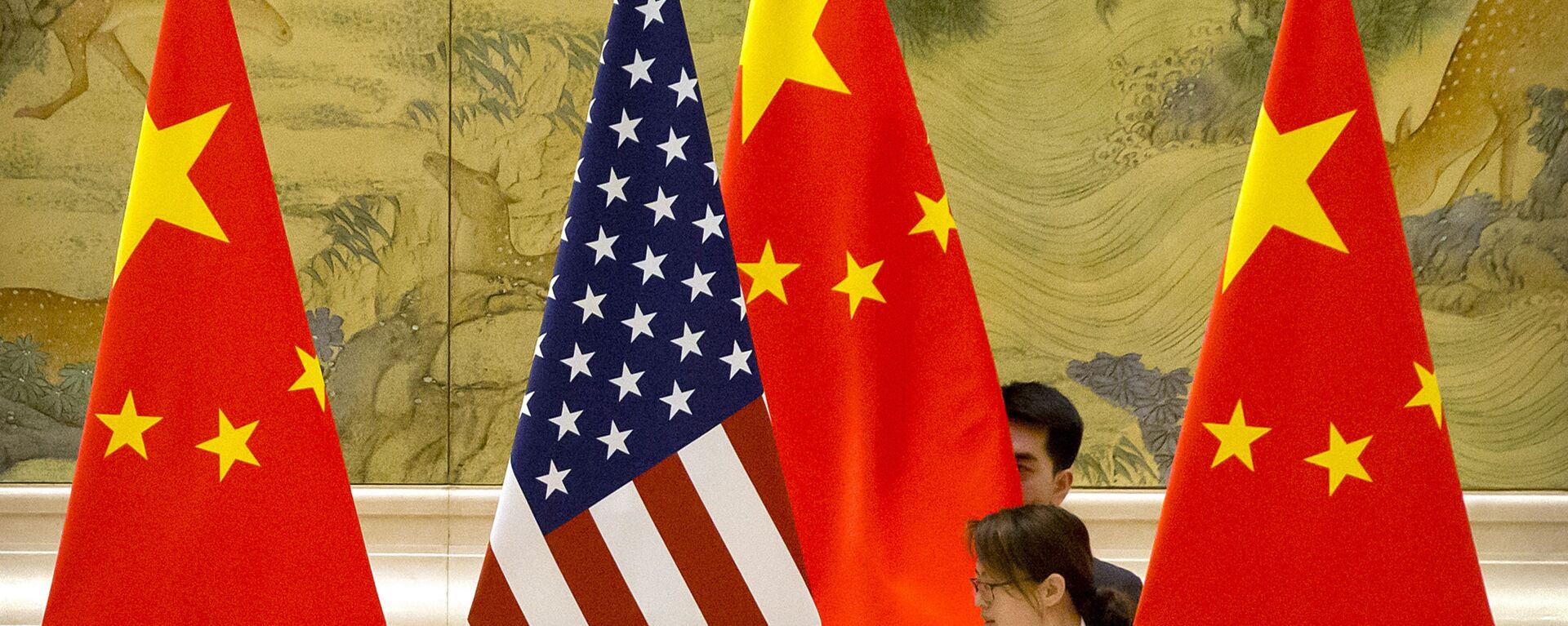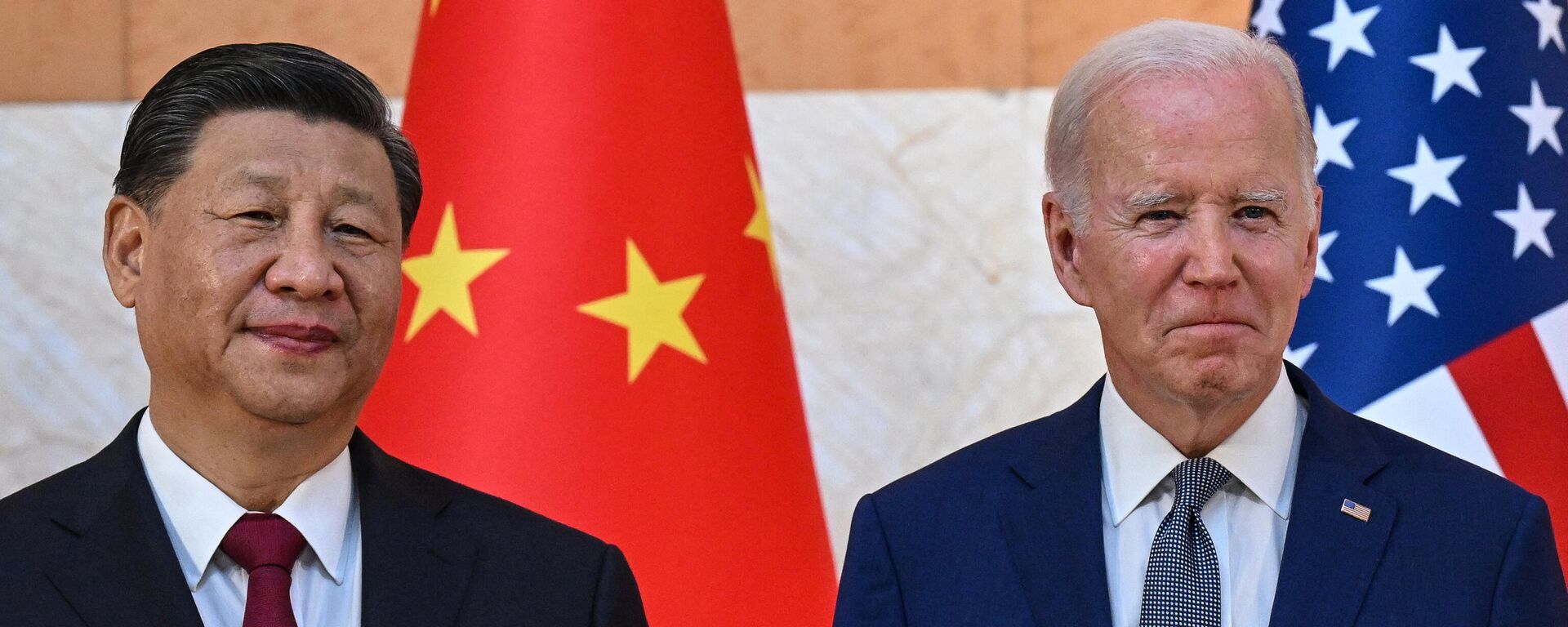https://sputnikglobe.com/20231214/shared-future-vietnam-china-pledge-to-resist-color-revolutions-during-xis-hanoi-visit-1115593408.html
‘Shared Future’: Vietnam, China Pledge to Resist ‘Color Revolutions’ During Xi's Hanoi Visit
‘Shared Future’: Vietnam, China Pledge to Resist ‘Color Revolutions’ During Xi's Hanoi Visit
Sputnik International
Two of the world’s declared socialist republics pledged to deepen commitments to cooperation and a “shared future” as the leaders of China and Vietnam penned dozens of agreements on trade, security, and other kinds of cooperation.
2023-12-14T20:37+0000
2023-12-14T20:37+0000
2023-12-14T20:34+0000
vietnam
china
trade
security cooperation
partnership
socialism
asia
https://cdn1.img.sputnikglobe.com/img/07e7/0c/0e/1115593566_0:0:3072:1728_1920x0_80_0_0_2295e1a7053fa3add71699a4397e6470.jpg
At a joint conference with Vietnamese President Vo Van Thuong in Hanoi on Wednesday, Chinese President Xi Jinping said the agreements would “open a new stage in the development of relations” between the two socialist states, which have had a tumultuous relationship since the mid-20th century. Xi said it was a step toward building a community with a “shared future.”In their joint statement, the two leaders said Sino-Vietnamese relations had been raised to a state of “greater political mutual trust, more substantive security cooperation, deeper practical cooperation, firmer social foundation, closer multilateral coordination, and better management of differences.”A particular point of contention the pair marked as a danger was “maritime differences” in the South China Sea, where Hanoi and Beijing have overlapping sea and island claims, leading to showdowns between fishing fleets, gas exploration vessels, and other incidents. The United States, inserting itself into the affairs of nations thousands of miles from its shores, has accused both states of violating the UN Convention on the Law of the Sea (UNCLOS), but clearly marked China as the major threat to smaller regional states, including Vietnam. The US has pushed trade and military deals with Hanoi in recent years, including a visit by a US aircraft carrier, in an effort to woo the smaller nation away from Chinese orbit.Officials signed 36 agreements in total, including on trade, railway and road connections, investment in green technologies, and on setting up a hotline for answering “unexpected incidents arising from fisheries activities at sea.”During his visit, Xi met with Nguyen Phu Trong, general secretary of the Vietnamese Communist Party, Prime Minister Pham Minh Chinh and Vuong Dinh Hue, chairman of the National Assembly of Vietnam.Xi’s visit comes after the US and Vietnam elevated their relations to being “comprehensive strategic partners” in September, although Beijing and Hanoi have referred to each other as such for more than 15 years.At the time, Vietnam made clear it “has no interest” in joining a “US-orchestrated” anti-China coalition. Other regional powers, such as the Philippines, have been more obliging, but Manila has also refused to allow Washington to use newly opened bases on its soil for offensive operations.In the 1970s, China and Vietnam became rivals after finding themselves on opposite sides of the fissure that opened in the worldwide communist movement, with Beijing and its allies on one side and the Soviet Union and its allies on the other. They even fought a brief war in 1979 after Vietnam invaded Cambodia and overthrew the murderous Khmer Rouge government, a Chinese ally. However, within a decade, the two nations had ended their border skirmishes and normalized relations, with a steady stream of agreements following in later years to write out the possibility of armed conflict between them.Today, China has become Vietnam’s top trade partner, accounting for 15.5% of total export values from Vietnam as of 2022 and 23.9% of Vietnamese imports. The two countries are both members of numerous international trade blocs and programs, from the Belt and Road Initiative to the Regional Comprehensive Economic Partnership (RCEP).
https://sputnikglobe.com/20231213/china-says-us-must-stop-interfering-in-upcoming-elections-in-taiwan-1115549009.html
https://sputnikglobe.com/20231212/us-house-committee-calls-for-hardening-us-economic-posture-toward-china-1115540453.html
vietnam
china
Sputnik International
feedback@sputniknews.com
+74956456601
MIA „Rosiya Segodnya“
2023
News
en_EN
Sputnik International
feedback@sputniknews.com
+74956456601
MIA „Rosiya Segodnya“
Sputnik International
feedback@sputniknews.com
+74956456601
MIA „Rosiya Segodnya“
state of sino-vietnamese relations, xi jinping visits vietnam,
state of sino-vietnamese relations, xi jinping visits vietnam,
‘Shared Future’: Vietnam, China Pledge to Resist ‘Color Revolutions’ During Xi's Hanoi Visit
Two of the world’s declared socialist republics pledged to deepen their commitments to cooperation and a “shared future” on Wednesday as the leaders of China and Vietnam penned dozens of agreements on trade, security, and other kinds of cooperation.
At a joint conference with Vietnamese President Vo Van Thuong in Hanoi on Wednesday, Chinese President Xi Jinping said the agreements would “open a new stage in the development of relations” between the two socialist states, which have had a tumultuous relationship since the mid-20th century. Xi said it was a step toward building a community with a “shared future.”
In their joint statement, the two leaders said Sino-Vietnamese relations had been raised to a state of “greater political mutual trust, more substantive security cooperation, deeper practical cooperation, firmer social foundation, closer multilateral coordination, and better management of differences.”
Officials also pledged to increase security and intelligence cooperation with the intent of preventing a “color revolution” in either country by “hostile forces.”
The specific phrasing could only refer to the United States, which fought a bloody war in Vietnam to prevent the spread of socialism in the 1960s and 1970s and which has declared its intent to halt the rise of China today through “great power competition.”
A particular point of contention the pair marked as a danger was “maritime differences” in the South China Sea, where Hanoi and Beijing have overlapping sea and island claims, leading to showdowns between fishing fleets, gas exploration vessels, and other incidents.
The United States,
inserting itself into the affairs of nations thousands of miles from its shores, has accused both states of violating the UN Convention on the Law of the Sea (UNCLOS), but clearly marked China as the major threat to smaller regional states, including Vietnam. The US has pushed trade and military deals with Hanoi in recent years, including a visit by a US aircraft carrier, in an effort to woo the smaller nation away from Chinese orbit.

13 December 2023, 05:42 GMT
Officials signed 36 agreements in total, including on trade, railway and road connections, investment in green technologies, and on setting up a hotline for answering “unexpected incidents arising from fisheries activities at sea.”
During his visit, Xi met with Nguyen Phu Trong, general secretary of the Vietnamese Communist Party, Prime Minister Pham Minh Chinh and Vuong Dinh Hue, chairman of the National Assembly of Vietnam.
“China would like to step up multilateral cooperation with Vietnam … increase the voice and influence of developing countries in international affairs,” Xi told Trong, who replied that Hanoi saw improving China-Vietnam relations as a top priority while reaffirming Hanoi would not harness its chariot to another nation’s steed.
Xi’s visit comes after the US and Vietnam elevated their relations to being “comprehensive strategic partners”
in September, although Beijing and Hanoi have referred to each other as such for more than 15 years.
At the time, Vietnam made clear it “has no interest” in joining a “US-orchestrated” anti-China coalition. Other regional powers, such as the Philippines, have been more obliging, but Manila has also
refused to allow Washington to use newly opened bases on its soil for offensive operations.

12 December 2023, 15:52 GMT
In the 1970s, China and Vietnam became rivals after finding themselves on opposite sides of the fissure that opened in the worldwide communist movement, with Beijing and its allies on one side and the Soviet Union and its allies on the other.
They even fought a brief war in 1979 after Vietnam invaded Cambodia and overthrew the murderous Khmer Rouge government, a Chinese ally. However, within a decade, the two nations had ended their border skirmishes and normalized relations, with a steady stream of agreements following in later years to write out the possibility of armed conflict between them.
The end of the Cold War in 1990 came amid a collapse of part of the communist sphere, with all of the Warsaw Pact allies, including the USSR, being replaced with restored capitalist states.
By the mid-1990s, only five states led by Marxist-Leninist parties remained: China and Vietnam, their neighbors Laos and North Korea, and Cuba. The crisis caused old animosities to be quickly buried as their friends dwindled in number.
Today, China has become Vietnam’s top trade partner, accounting for 15.5% of total export values from Vietnam as of 2022 and 23.9% of Vietnamese imports. The two countries are both members of numerous
international trade blocs and programs, from the Belt and Road Initiative to the Regional Comprehensive Economic Partnership (RCEP).






